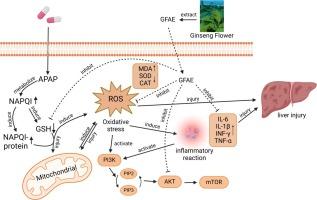人参花酒精提取物对药物引起的肝毒性的改善作用:关注 PI3K/AKT/mTOR 信号调节和肠道微生物群平衡
IF 3.8
2区 农林科学
Q2 FOOD SCIENCE & TECHNOLOGY
引用次数: 0
摘要
本研究主要探讨了人参花醇提取物(GFAE)对药物性肝损伤(DILI)小鼠模型的影响及其作用机制。用酒精提取人参花,并使用高效液相色谱法(HPLC)检测其主要活性成分,结果显示人参花醇提取物由六种人参皂苷活性成分组成。通过建立 DILI 小鼠模型并测量其相关炎症指标和相关蛋白,发现 GFAE 可通过减少炎症因子、抑制炎症和肝细胞凋亡来治疗 DILI、抑制磷脂酰肌醇 3-Kinase/Protein Kinase B/Mammalian Rapamycin Target Protein (PI3K/AKT/mTOR) 信号通路的异常激活,增加肠道有益菌,提高肠道菌群多样性,改善肠道环境。本文章由计算机程序翻译,如有差异,请以英文原文为准。

Ameliorative actions of ginseng flower alcoholic extract, on drug-induced hepatotoxicity: A focus on PI3K/AKT/mTOR signaling modulation and intestinal microbiome homeostasis
This study focused on examining the effects and mechanism of action of ginseng flower alcohol extract (GFAE) on a drug-induced liver injury (DILI) mice model. Ginseng blossoms were extracted with alcohol and examined for their principal active components using high performance liquid chromatography (HPLC), revealing that GFAE was made up of six ginsenoside active components. By creating a mouse model of DILI and measuring its relevant inflammatory indexes and related proteins, it was revealed that GFAE treats DILI by decreasing inflammatory factors, inhibiting inflammation and hepatocyte apoptosis, suppressing abnormal activation of the Phosphatidylinositol 3-Kinase/Protein Kinase B/Mammalian Rapamycin Target Protein (PI3K/AKT/mTOR) signaling pathway, and increasing beneficial bacteria in the intestinal tract, enhancing intestinal flora diversity, and improving the intestinal environment.
求助全文
通过发布文献求助,成功后即可免费获取论文全文。
去求助
来源期刊

Journal of Functional Foods
FOOD SCIENCE & TECHNOLOGY-
CiteScore
9.60
自引率
1.80%
发文量
428
审稿时长
76 days
期刊介绍:
Journal of Functional Foods continues with the same aims and scope, editorial team, submission system and rigorous peer review. We give authors the possibility to publish their top-quality papers in a well-established leading journal in the food and nutrition fields. The Journal will keep its rigorous criteria to screen high impact research addressing relevant scientific topics and performed by sound methodologies.
The Journal of Functional Foods aims to bring together the results of fundamental and applied research into healthy foods and biologically active food ingredients.
The Journal is centered in the specific area at the boundaries among food technology, nutrition and health welcoming papers having a good interdisciplinary approach. The Journal will cover the fields of plant bioactives; dietary fibre, probiotics; functional lipids; bioactive peptides; vitamins, minerals and botanicals and other dietary supplements. Nutritional and technological aspects related to the development of functional foods and beverages are of core interest to the journal. Experimental works dealing with food digestion, bioavailability of food bioactives and on the mechanisms by which foods and their components are able to modulate physiological parameters connected with disease prevention are of particular interest as well as those dealing with personalized nutrition and nutritional needs in pathological subjects.
 求助内容:
求助内容: 应助结果提醒方式:
应助结果提醒方式:


